If you are looking to renovate a kitchen or bath or are building from the ground up, one of the many decisions you have to make is selecting the type of countertop material to use.
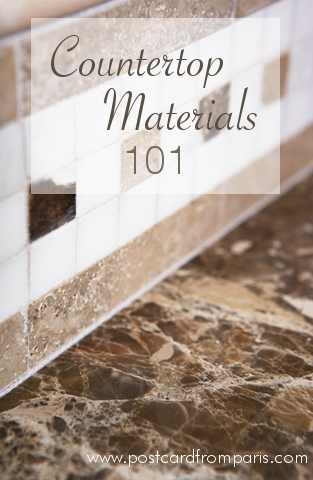
All materials have various advantages and disadvantages. Knowing the durability and maintenance required for each material is important before making a decision. Cost will also play a factor, as some are more expensive than others.
Today, we're sharing lessons in countertop materials 101, breaking down the pros and cons for each along with providing a general price range.
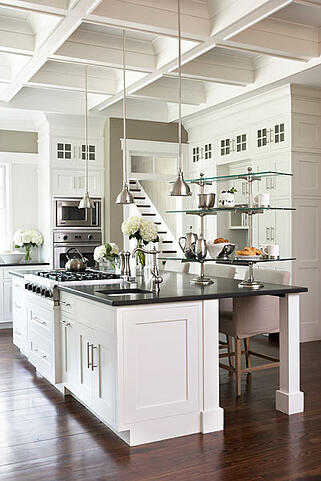
Granite
Pros: Granite is very durable. It has the second highest hardness rating after diamonds. Granite is also very resistant to scratches, staining, water, and heat. It comes in a wide array of colors and patterns due to its natural quality. It is also comparatively low maintenance so it is suitable for all rooms in your home.
Cons: Granite is porous. A sealant will need to be applied about once a year. The sealant will prevent stains and prevent harboring of bacteria in its pores. Some granites are more porous than others so check on the specifics of your final choice. Granite can also be quite pricey so keep that in mind when creating a budget.
Price Range: $60-$200 per foot installed.
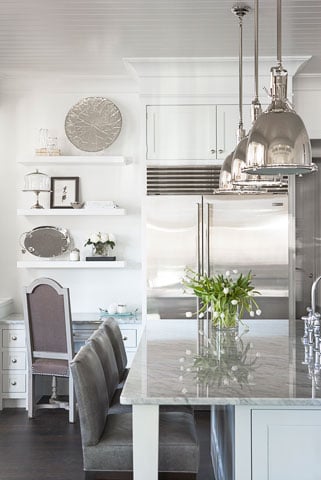
Marble
Pros: The marble family, which includes limestone and travertine, has a very high quality and is visually impressive. It works well with almost all styles and in most any room except for kitchens and bathrooms. Even in those two rooms, it can work as long as you like materials that age and show wear and "personality." It is chip and heat resistant and available in a broad range of colors and veining patterns.
Cons: These materials will stain, scratch, and etch if exposed to acidic materials, although it will etch less if honed. It is more porous than granite and requires sealing a few times a year. Even with that, spills need to be cleaned up quickly! Marble is another material that can also be rather pricey.
Price range: $70-$400 per foot installed.
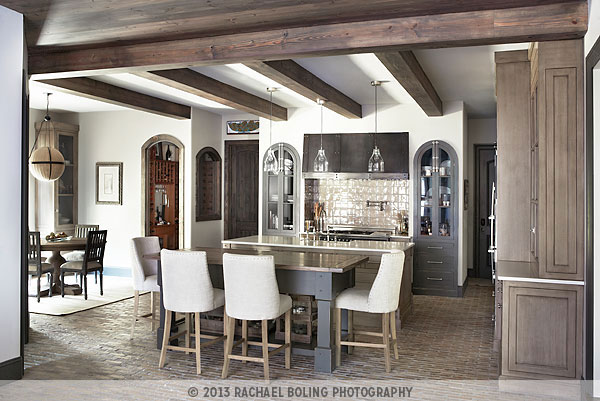
Engineered Stone
Engineered stone is made of 93% crushed natural quartz and 7% resin and includes Caesarstone, Silestone and Cambria.
Pros: It is non-porous, low maintenance, and looks like natural stone but has less variation. It can be custom colored and can flex so it can be fabricated in larger pieces than natural stone. This results in fewer joints. In terms of sustainability, many engineered stones use recycled content and the material emits few VOCs {volatile organic compounds}. It resists staining more than granite, marble or concrete. Also, being non-porous, it won't harbor bacteria or viruses and additional sealing isn't necessary.
Cons: There aren't many! It isn't heat resistant as the resin in not heat tolerant. Seams are sometimes noticeable as they are with granite and marble. Price range is similar to granite.
Price range: $70-$200 per foot installed.
Soapstone
Pros: It is non-porous thus antibacterial. It won't etch from acids. It has a fairly monochromatic color range of various shades of grey or green. There is often some interesting veining caused by quartz in the mineral talc, which is the main component of soapstone.
Cons: Soapstone is softer than other stones so edges may wear over time. This may not be considered a negative by some. Many people find this charming as well as its tendency to darken over time. This stone will scratch and show nicks, but this can be easily sanded out.
Price range: $65-$125 per foot installed.
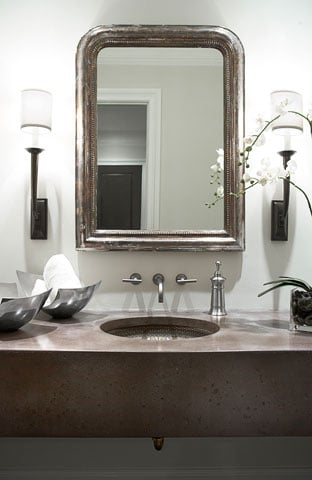
Concrete
Pros: Concrete is heat and scratch resistant, smooth, strong, and offes many color and texture options. It can be formed with integral dish drains, sinks, backsplashes and can be formed in unusual shapes.
Cons: The material can crack, but typically not structural cracks, and it is not a common problem. It does not need to be sealed as it is porous. Concrete is not as easily adaptable to all design styles as are more natural materials.
Price range: $60-$150 per foot installed.
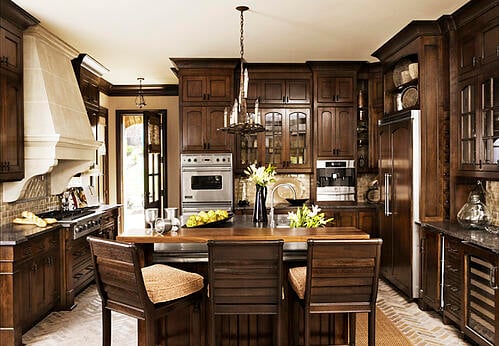
Wood
Pros: Wood includes butcher block, reclaimed wood and "new wood." Most agree that wood has an undeniable warmth to it. Wood allows cutting and chopping without dulling knives, and wears with time to a charming patina. It seems at home with most design styles. It can be sustainable if salvaged or re-purposed.
Cons: Wood requires proper sealing. In a kitchen, it needs to be a food-friendly sealer such as mineral oil. The counter may need refinishing at some point, and it may suffer from scratches and dents.
Price range: $32-$250 per foot installed.
Laminate
Pros: Laminate countertops are low cost, stain resistant, low maintenance and offer many color and pattern options.
Cons: This material can crack and scratch, is not heat resistant, and is difficult to repair. It is not perceived as a "wow" option.
Price range: $50-$60 per foot installed.
Now that you know the differences between the various countertop materials, it's time to make some decisions! For additional help, download these general guidelines and tips from our design team.
Photos by: Rachael Boling

